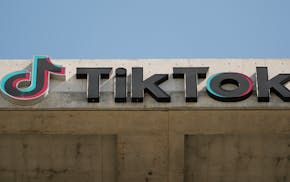WASHINGTON – To personify something as complex and vital as the federal Highway Trust Fund, consider Martin Road, a six-mile stretch north of Duluth that in infrastructure lexicon is dubbed a "minor arterial."
Martin Road has weathered some rough winters and needs to be repaved next year at a cost of $3.2 million. The feds should pick up $2.5 million of that tab, while sparsely populated St. Louis County will pull together the remaining $700,000.
But Martin Road and hundreds of planned road projects in Minnesota could be put on ice if Congress doesn't come up with even a temporary patch for the Trust Fund. The cash reserves are set to fall below what is required by Aug. 29, while Congress is in recess.
Minnesota undertakes between 300 and 400 highway projects a year. This year's price tag for those bridge repairs, road expansions and repaving projects is about $3.1 billion, with about 30 percent of the tab picked up by the federal government. Of the 138,702 miles of public roads in Minnesota, 11 percent are in poor condition. Of the 13,137 public bridges, 12 percent are in poor condition, according to numbers released by the White House.
Current projects should be fine if the fund falls below its required reserves this year, but next year could be a different story.
"We all know the issues here," said U.S. Sen. Amy Klobuchar, D-Minn. "Americans spend 5.5 billion hours a year stuck in traffic. It costs our economy, it costs our individuals. No one knows that better than Minnesota."
Even most Republicans on Capitol Hill agree. The House on Tuesday handily approved a measure to fund the trust through next spring. The Senate is bandying a similar version that would divert dollars from other pots, including customs fees and pensions.
Among the biggest reasons the fund is failing and requires a longer-term fix: a weakened economy and more fuel-efficient vehicles, which means many people are paying less in gas taxes than they were even a decade ago.
Since 2008, Congress has had to siphon $53 million from other revenue streams to backfill the fund. Over the next six years, there could be a projected additional shortfall of $100 billion, according to the Congressional Budget Office.
One obvious solution would be to boost the gas tax, but neither Democrats nor Republicans have an appetite for that. Other permanent solutions include charging people by the mile when they drive or generating more revenue from offshore drilling or energy production on federal lands.
"It's going to take leadership," said Jim Burnley, former transportation secretary in the Reagan administration and a Washington, D.C., transportation lawyer. "These things don't happen by osmosis. … There has to be a point at which the Obama administration and the leadership in both parties in Congress come to the same place about how to fund infrastructure."
Burnley said the demand for infrastructure is flourishing more than ever with a growing economy and people who "keep buying more stuff."
In a growing economy, he said, "there will be more freight. Over 70 percent of freight in the country moves by truck and someone has to pay for it."
State and local officials worry that if the Trust Fund doesn't stay afloat, the federal Department of Transportation could start slowing reimbursements for state and local highway projects. Local governments typically pay the project costs upfront and are reimbursed by the feds within a week or two.
Minnesota Department of Transportation Commissioner Charles Zelle has assembled a list of worst-case scenarios should the fund become insolvent next year. Among the options: focusing solely on maintenance.
Rep. Collin Peterson, D-Minn., said he and Zelle fear that if transportation projects in Minnesota are shut down, they would lose good workers to the oil fields in North Dakota.
But the calendar may offer some measure of comfort. The House and a third of the Senate are on the ballot in November, and incumbents may prefer not having to explain why the road projects — and the jobs they provide — are going away.
"My expectation is something will get done," said Peterson. "But it may only be a short-term thing."
Allison Sherry • 1-202-383-6120

Person rushed away on a stretcher after fire extinguished outside Trump hush money trial
Attorneys argue that Florida law discriminates against Chinese nationals trying to buy homes
The Latest | Person rushed away on stretcher after fire extinguished outside Trump hush money trial

